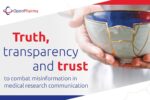This week, we read about improving incentives for peer reviewers, the author–editor networks that are used to publish fraudulent research and the gaming of the scientific system through strategic manipulation. We listen to a podcast about the pros and cons of paying patient authors, and we highlight a call to action for NIH’s policy on capping publisher fees. We invite you to engage with RRiA’s ‘unconference’ for responsible research and NASA’s virtual Open Science Essentials training course. Finally, we signpost STM’s upcoming conference on the role of publishers in science diplomacy.
To read:
Recognizing and rewarding reviewers’ efforts will improve peer review via CoARA | 1-hour read
Peer review is integral to maintaining the quality and integrity of research. But, despite its importance, it is rarely acknowledged or rewarded, leading to a lack of incentive to perform high-quality reviews. To tackle this problem, a Coalition for Advancing Research Assessment (CoARA) working group has published recommendations for recognizing and rewarding peer review. These recommendations include the development of digital infrastructure for crediting peer review activities (e.g. ORCID integration) and including peer review as part of performance evaluations.
Author–editor networks enable the publication of retraction-prone papers via Nature | 8-minute read
A recent investigation has identified networks of authors and editors who cooperate to publish retraction-prone scientific papers. A group of 45 editors at Public Library of Science (PLOS) ONE, responsible for editing 1.3% of the journal’s articles published between 2006–2024, accounted for 30% of the retractions issued. Although the investigation did not name the editors, Nature has identified four and provides further details of their other questionable scientific activities.
Who’s playing the game? Identifying the what, who, where and how of scientific manipulation via The Scholarly Kitchen | 4-minute read
Misinformation and disinformation can infiltrate the scientific landscape through strategic manipulation, in effect, gaming the system in ways that may be technically allowable but that are ultimately undermining the true purpose of scientific research. In this article, Leslie McIntosh (Vice President of Research Integrity at Digital Science) and Will White (Health Sciences Librarian at the University of Wisconsin-Milwaukee) suggest a taxonomy of scholarly manipulation to illustrate the what, who, where and how of strategic scientific manipulation. They urge the scholarly community to join the effort to “map a more transparent, rigorous framework for naming, detecting, and understanding scientific norms and aberrations”.
To listen to:
What are the pros and cons of paying patient authors? via ISMPP | 28-minute listen
In the most recent episode of the In Plain Cite podcast from the International Society for Medical Publication Professionals (ISMPP), Veronica Porkess (Publications Lead at UCB) and Simon Stones (Scientific Director of Patient Engagement at Amica Scientific) explore the ethics and practical challenges of compensating patient authors. Their discussion covers key issues including equity, selection bias, transparency and the tokenistic inclusion of patient authors.
To engage with:
Call to action: share your opinions on NIH’s policy to cap publisher fees via NIH
Previously, we reported plans by the National Institutes of Health (NIH) to cap fees that publishers can charge NIH-supported researchers in order to strike a balance between research dissemination, taxpayer burden and scientific integrity. The NIH Office of Science Policy is now calling for your opinions on this proposal. Comments can be submitted anonymously and will be accepted until 15 September 2025.
Participate in RRiA’s ‘unconference’ and have your say on responsible research practices via RRiA
Responsible Research in Action (RRiA) has published a list of 10 available projects that will be discussed at their 2025 ‘unconference’ on 22–24 September 2025 in Berlin, Germany. The unconference promises an interactive, team-based environment. Teams will aim to advance responsible research by deciding on tangible outcomes, such as white papers and practical recommendations, on several topics including reproducibility, accessibility and improving research culture. Deadline for registration is 7 September 2025 (registration fees apply).
NASA launches an Open Science Essentials online training course via NASA STEM Gateway
National Aeronautics and Space Administration (NASA), through their Science, Technology, Engineering and Math (STEM) Gateway programme, has recently announced an Open Science Essentials online training course that is available to participants of various ages and backgrounds. The course comprises five lessons that aim to provide “introductory knowledge of the principles, practices, and tools necessary to conduct open science”. Deadline for registration is 30 September 2025. More information about NASA’s open science training programme can be found here.
Publishers hold up ‘the invisible bridge’ of science diplomacy via STM
Publishing not only enables the dissemination of science but also builds common ground and shared standards of rigour within the scientific community, which is particularly important in politically challenging times. At this conference from the International Association of Scientific, Technical & Medical Publishers (STM), delegates will discuss the importance of science diplomacy and the role of publishers in advancing it. There will be a keynote speech by Jean-Christophe Mauduit (Associate Professor of Science Diplomacy at University College London), plus discussions on working with the community on science diplomacy and the link between science diplomacy and global security. The conference takes place from 13 to 14 October 2025; registration fees apply.
Enjoy our content? Read last week’s digest and check out our latest quarterly update!
Don’t forget to follow us on Bluesky and LinkedIn for regular updates!






